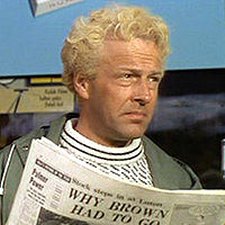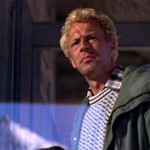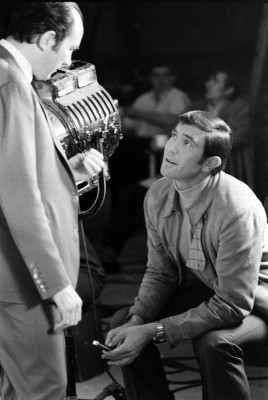 One of the key but relatively understated support roles in On Her Majesty’s Secret Service (1969) was that of Bond’s contact in Bern and again at the Alpine village just below Piz Gloria. This essential part to the storyline was taken by the actor Bernard Horsfall (1930-2013), who was the MI6 agent and main contact for George Lazenby’s 007 in Switzerland, but who was eventually captured and murdered by Blofeld’s SPECTRE henchmen.
One of the key but relatively understated support roles in On Her Majesty’s Secret Service (1969) was that of Bond’s contact in Bern and again at the Alpine village just below Piz Gloria. This essential part to the storyline was taken by the actor Bernard Horsfall (1930-2013), who was the MI6 agent and main contact for George Lazenby’s 007 in Switzerland, but who was eventually captured and murdered by Blofeld’s SPECTRE henchmen.
Horsfall, who was born in Hertfordshire in England in 1930, sadly died on January 29, 2013, aged 82. He began acting in the late 1950s, and made his film debut in the 1957 movie High Flight, which starred Ray Milland. Horsfall went on to take a large variety of parts in film, TV and on the stage. Indeed, he had roles in episodes of some classic British TV series, such as Z-Cars, The Avengers, The Saint (with Roger Moore), The Persuaders (with Moore), the legal drama Crown Court, and Dr. Who. In fact, he became quite a regular in the Who sci-fi series, appearing in no less than 15 episodes.
In the James Bond movie On Her Majesty’s Secret Service (OHMSS), Bernard played a character named Campbell (sometimes listed as Shaun, or ‘Shawn’, Campbell). Campbell is the agent who first helps Lazenby’s Bond by ensuring that a construction site crane lifts a special safecracking device over to 007 at Gumbold’s office in Bern. It a sequence full of tension, helped considerably by John Barry’s highly memorable music. It is also a sequence where Lazenby’s 007 shows a super-cool nonchalance as the machine he has been supplied with helps him break into a safe to copy some private correspondence and secret papers, which helps put him on the trail again of his arch-enemy Ernst Stavro Blofeld.
Campbell also witnesses Bond’s arrival in Switzerland and, disguised as Sir Hilary Bray, 007’s transfer by helicopter to Piz Gloria, accompanied by Blofeld’s assistant, Irma Bunt (Ilse Steppat).
Campbell is later seen trying to take the cable car to the Bleuchamp Institute, but Blofeld’s thuggish henchman Gunther makes it very clear that it is private property (for some reason, this scene was often cut in TV screenings of the movie). Campbell is later detained by Blofeld’s men while trying to engage in some mountaineering, and protests after Blofeld tells him the Institute’s surroundings are ‘private property’ on which he had been trespassing. As we find out later, Campbell and is murdered and his body is used to taunt Bond. It was a relatively minor, but nevertheless crucial role in the movie, and reminds us how well the late director Peter Hunt chose his supporting cast.
Horsfall and Hunt were also reunited in the 1970s, when Horsfall had roles in the Roger Moore movies Gold (1974), and Shout at the Devil (1976), both directed by Hunt. Horsfall’s other film roles included Gandhi (1982) and Braveheart (1995).
Bonding with the Stars
In February, 2012, the British cable TV channel ‘Yesterday’ screened a welcome repeat showing of the ITV wartime drama Enemy at the Door, which had not been shown for many years. The series was recently repeated again by the ‘Talking Pictures’ channel in Britain during 2022-23. This rather neglected television series is something of a gem. It is about the German occupation of the Channel island of Guernsey and was first screened in the UK by ITV back in 1978-1980. One of the main roles in the 26-part series, that of of Dr. Philip Martell, was played by Horsfall. In what was arguably one of his most powerful TV performances, Horsfall’s character was a doctor trying to carry on with his medical work for the islanders while still facing all the moral dilemmas created by the German occupation.

Interestingly, Enemy at the Door also saw some other Bond-related actors in guest appearances, such as John Rhys-Davies (who went on to play General Pushkin in The Living Daylights), and David Calder (who went on to play Sir Robert King in The World Is Not Enough). One episode from the second series, entitled ‘The Education of Nils Borg’, first broadcast in March, 1980, is particularly poignant, as it has a key role for Cassandra Harris as Trudi Engel, a seductive official from the German Nazi Propaganda Ministry. Harris, of course, just a year later, had to put on a German (or, rather, an Austrian-sounding) accent again when she played the role of Countess Lisl Von Schlaf in For Your Eyes Only (1981). Harris was also, of course, the wife of Pierce Brosnan.
Bernard Horsfall also had a highly distinguished career on the stage, serving for a long time with the Royal Shakespeare Company. His last major movie role was in Mel Gibson’s Braveheart (1995), and his very last film appearance was in Stone of Destiny (2008). Tall and authoritative, he apparently became something of a father figure to other actors he worked with. Moreover, later in life, he came across as a real gentleman with members of the public, and was often very patient and generous with his time, sometimes bemused but also very happy to give autographs to fans (unsurprisingly, he was both popular with Dr. Who and James Bond fans in particular). He made appearances at a number of film and TV conventions, such as the London Film and Comic Con in 2009, but gave very few interviews with the press during his career, preferring (perhaps wisely) to steer clear of showbiz journalists, and to keep many of his stage and film stories very much to himself or, as he explained, ‘off the record’.
However, in some personal comments he made to the JBIFC about his memories of OHMSS, Bernard said that, while it had been ‘hard work’ on location for the film, he had nevertheless enjoyed Switzerland and he was full of praise for director Peter Hunt. In fact, the two developed such a good working relationship that Horsfall was sought out and reunited with the director for parts in Hunt’s two Roger Moore movies Gold and Shout at the Devil, and for this Bernard remained ‘very grateful’. He said he had been very sad to hear of Peter’s death in 2002.
Bernard Horsfall’s role in OHMSS, although minor in one sense, was arguably an important component of what was, after all, a gritty and very authentic Bond movie, a 007 adventure that remains to this day a firm favourite with many Bond aficionados. His extensive career in theatre, film and TV illustrates once again the high quality of artists who have contributed to the EON franchise over the last 60 years.

Director Peter Hunt converses on set with George Lazenby.
